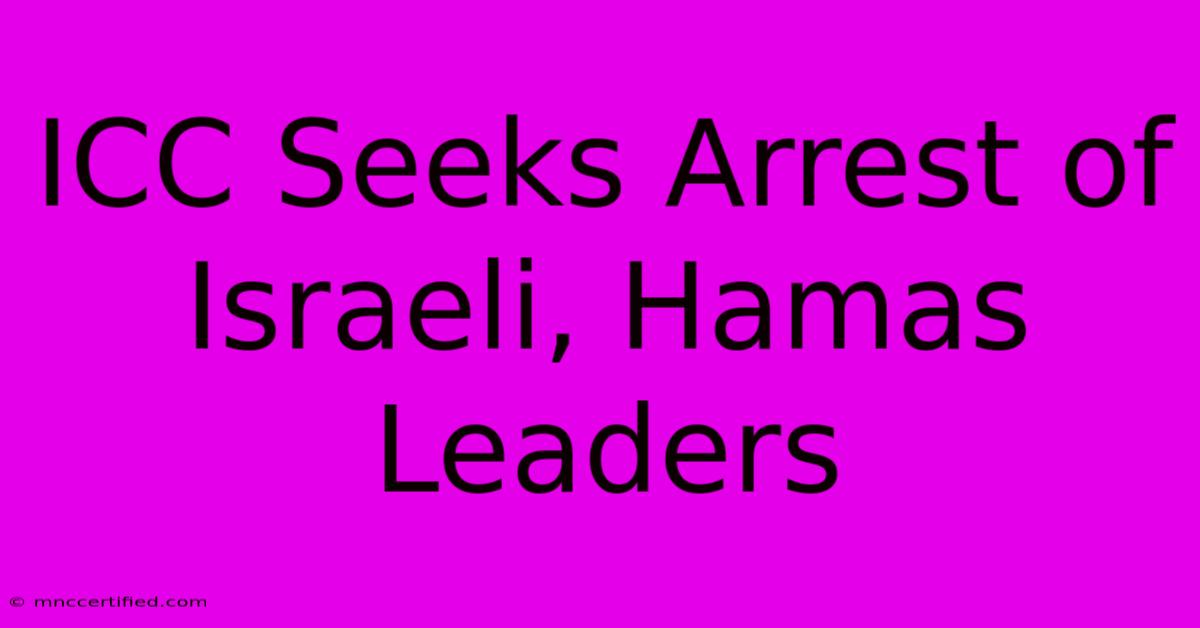ICC Seeks Arrest Of Israeli, Hamas Leaders

Table of Contents
ICC Seeks Arrest of Israeli, Hamas Leaders: A Deep Dive into the International Criminal Court's Investigation
The International Criminal Court (ICC) has issued arrest warrants for several high-profile individuals, including both Israeli and Hamas leaders, marking a significant escalation in its investigation into alleged war crimes committed during the 2021 conflict in Gaza. This unprecedented move has ignited a firestorm of international debate, highlighting the complex legal and political landscape surrounding the ICC's jurisdiction and the ongoing Israeli-Palestinian conflict. This article will delve into the details of the ICC's actions, the reactions from involved parties, and the broader implications for international law.
Understanding the ICC's Investigation
The ICC's investigation into the situation in Palestine began in 2019, focusing on alleged war crimes and crimes against humanity committed in the occupied Palestinian territories since June 13, 2014. The investigation is not limited to specific incidents, but covers a broader pattern of alleged violations. The warrants, issued under Article 58 of the Rome Statute, are based on the ICC Prosecutor's findings of reasonable grounds to believe that crimes within the Court's jurisdiction have been committed.
The Prosecutor's office has meticulously gathered evidence over several years, including witness testimonies, documentation, and forensic analysis. This evidence, according to the ICC, suggests that both Israeli and Hamas forces may have committed acts that constitute war crimes, such as disproportionate attacks on civilians, targeting of protected objects, and the use of illegal weapons.
Key Figures Targeted by Arrest Warrants
While the specific identities of those indicted remain fluid due to the sensitive nature of the situation and ongoing investigations, the ICC's warrants highlight the targeting of high-ranking officials from both sides of the conflict. This sends a powerful message that accountability extends to leaders responsible for directing or authorizing alleged unlawful acts, regardless of their position. The unprecedented nature of issuing warrants for individuals on both sides emphasizes the ICC's commitment to impartiality.
International Reactions and the Political Fallout
The ICC's actions have predictably resulted in a range of reactions from the international community. Israel has vehemently condemned the warrants, asserting that the ICC lacks jurisdiction over the territories in question and that the investigation is politically motivated. Hamas, while outwardly appearing to support the ICC's move, has also faced criticism for its own alleged human rights abuses.
Several countries, particularly those with strong ties to Israel, have expressed concerns about the ICC's investigation and its potential impact on regional stability. This underscores the complex geopolitical dynamics at play, with states aligning their responses based on their national interests and relationships with the involved parties. The controversy highlights the significant challenges faced by the ICC in navigating highly politicized conflicts and securing cooperation from powerful states.
Challenges to ICC Jurisdiction and Enforcement
A key challenge facing the ICC is enforcing its arrest warrants. Israel, like several other states, is not a signatory to the Rome Statute and thus does not recognize the Court's jurisdiction. This raises questions about the feasibility of arresting and extraditing those indicted. The enforcement of international criminal law often hinges on political will and international cooperation, which in this case is heavily strained. The ICC will need to explore alternative avenues for ensuring accountability, potentially through diplomatic pressure or cooperation with states willing to support the warrants.
The Implications for International Law and Future Conflicts
The ICC's pursuit of justice in the Israeli-Palestinian conflict carries significant implications for the future of international law and accountability for war crimes. The success or failure of this case will significantly influence the deterrent effect of the ICC and its ability to hold powerful actors accountable for their actions.
This case also serves as a crucial test for the ICC's mandate. The ability to investigate and prosecute individuals on both sides of a conflict showcases its commitment to impartiality. However, the political backlash and jurisdictional challenges highlight the difficulties in navigating complex conflicts and ensuring the effectiveness of international criminal justice.
Moving forward, the international community must engage in a thoughtful and nuanced discussion about the complexities of international law, the limitations of current international justice mechanisms, and the need for greater accountability in conflict situations. The ICC's investigation, despite the challenges, remains a significant step in the pursuit of justice and the broader goal of preventing future atrocities.

Thank you for visiting our website wich cover about ICC Seeks Arrest Of Israeli, Hamas Leaders. We hope the information provided has been useful to you. Feel free to contact us if you have any questions or need further assistance. See you next time and dont miss to bookmark.
Featured Posts
-
Arsenal 1 0 Juventus Womens Cl Reaction
Nov 22, 2024
-
Sure Choice Homeowners Insurance
Nov 22, 2024
-
Riddle Insurance Madisonville Ky
Nov 22, 2024
-
Unison Remembers John Prescott
Nov 22, 2024
-
Burghart Vs Rayner Pmqs Clash Explained
Nov 22, 2024